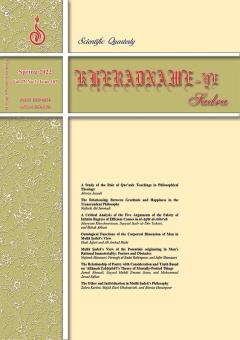-
-
List of Articles
-
Open Access Article
1 - Editor Notes
S. Mohammad Khamenei -
Open Access Article
2 - A Study of the Role of Qur’anic Teachings in Philosophical Theology
Aireza Asadi -
Open Access Article
3 - The Relationship Between Gratitude and Happiness in the Transcendent Philosophy
Nafiseh Ahl Sarmadi -
Open Access Article
4 - A Critical Analysis of the Five Arguments of the Falsity of Infinite Regress of Efficient Causes in al-Asfār al-Arba‘ah
Maryam Khoshnevisan Seyyed Sadr al-Din Taheri Babak Abbasi -
Open Access Article
5 - Ontological Functions of the Corporeal Dimension of Man in Mullā Ṣadrā’s View
Hadi Jafary Ali Arshad Riahi -
Open Access Article
6 - Mullā Ṣadrā’s View of the Potentials originating in Man’s Rational Immateriality: Factors and Obstacles
Najimeh Mansouri Furugh al-Sadat Rahimpoor Jafar Shanazari -
Open Access Article
7 - The Relationship of Poetry with Consideration and Truth Based on ‘Allāmah Ṭabāṭabā’ī’s Theory of Mentally-Posited Things
Jamal Ahmadi Seyyed Mehdi Emami Jume Emami Jume Mohammad Javad Safian -
Open Access Article
8 - The Other and Individuation in Mullā Ṣadrā’s Philosophy
Zahra Karimi Majid Ziaei Ghahnavieh Alireza Hasanpour
-
The rights to this website are owned by the Raimag Press Management System.
Copyright © 2017-2026







